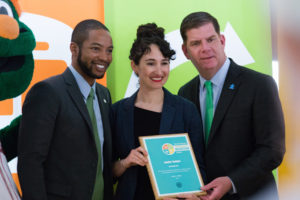
The Greenovate Awards recognize climate action leadership and environmental sustainability excellence in the City of Boston. Read this blog series to find out more about this year’s winners in the Sustainable Food Category.
Access to healthy, local food is a clear community priority for Bostonians. Urban farming, local farmer’s markets, community garden plots are all starting to shape the rich culture of local food in our City and will help support a local food system that will make Boston more resilient in a changing climate.
JENNIFER RUSHLOW, JAMAICA PLAIN

About Jennifer Rushlow
In her role as Staff Attorney and Director of the Farm and Food Initiative at Conservation Law Foundation, Jenny created the Legal Services Food Hub, a pro bono legal services network for farmers and food businesses. Since launching in 2014, the Legal Services Food Hub has helped more than 100 businesses and leveraged over $500,000 in free legal help for farmers and food entrepreneurs. Over 50 law firms in MA alone have joined the Hub.
What makes Jennifer Rushlow an outstanding leader in creating a green and sustainable future for the City of Boston
The legal assistance provided by the Legal Services Food Hub is based in transactional law, helping businesses to select the right entity and incorporate, trademark their business name, draft and negotiate contracts, and lease farmland or commercial space. The Hub was engaged with many small farmers and businesses to help navigate their leases with the new Boston Public Market. The Hub also helps bring healthy food to Boston’s low-income neighborhoods by supporting ventures advancing local and sustainable food.
MATTAPAN ECOVATION CENTER, MATTAPAN
About Mattapan Ecovation Center
Mattapan Ecovation Center is a 2,800 square foot greenhouse developed as a demonstration site to harness bioenergy from a composting facility and use it to heat a greenhouse for food production, education, and sustainable landscape demonstration. The composting greenhouse is used to recycle approximately 1,000 cubic yards of organic materials annually. The composting greenhouse was developed in partnership with the Boston Public Works compost facility at Mass Audubon’s Boston Nature Center with Mass Department of Agriculture and City Soil funding.
What makes Mattapan Ecovation Center an outstanding leader in creating a green and sustainable future for the City of Boston
The Mattapan Ecovation Center facility recycles organic materials from residents citywide. It provides the community with a space to not only empower residents and local businesses to engage in sustainable food practices, but demonstrates other environmental sustainable practices. More than 85 percent recycled steel, lumber, and organic materials were used in construction of the greenhouse frame and growing beds, and the site includes an advanced stormwater management system.
The Ecovation Center is growing tomatoes, culinary and medicinal herbs, as well as propagating flowers, perennial plants and trees for use in the surrounding landscape and for green roofs to demonstrate that crops with commercial value can be produced in an urban environment.


Recent Comments